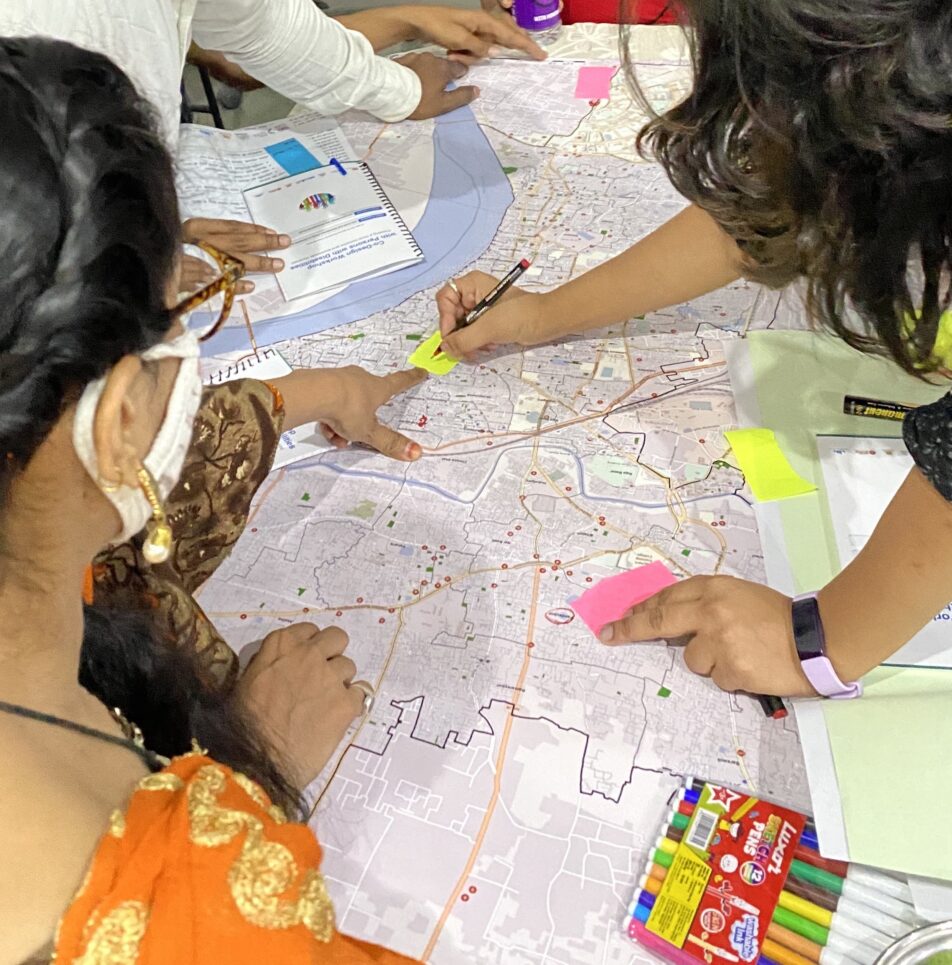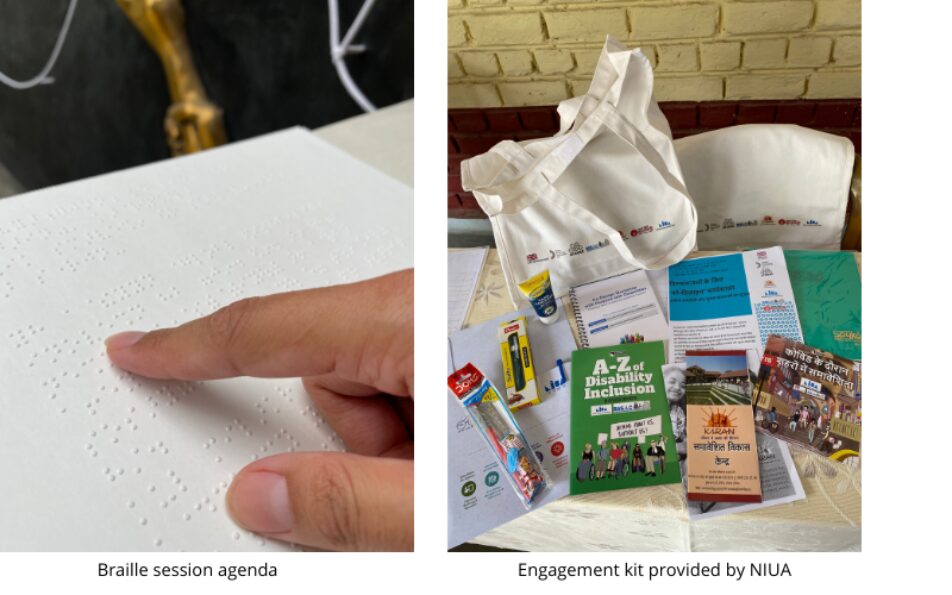Co-design workshop exploring inclusive and accessible urban environment in Varanasi, India
GDI Hub, NIUA and Kiran Society hold co design workshop to build insights on creating inclusive and accessible urban environment in Varanasi, India
Global Disability Innovation Hub (GDI Hub) and National Institute of Urban Affairs (NIUA) in partnership with Kiran Society (city-based Non-Governmental Organization) along with the support from Varanasi Smart City Ltd (VSCL) organised a workshop in Varanasi to gather insights on creating more inclusive and accessible urban environments in the city.
As part of the ongoing research case study, the workshop aimed to understand the state of inclusive design and accessible urban environment in the city of Varanasi. The findings and key learnings from the workshop would support two UK Aid funded programmes:
- GDI Hub-led AT2030 ‘Life changing assistive technology for all’ (sub-programme delivering inclusive design and infrastructure in 6 cities around the world)
- NIUA-led BASIIC programme on Building Accessible, Safe and Inclusive Indian Cities (Varanasi being one of the partner cities).
The workshop looked to understand the barriers and challenges faced by Persons with Disabilities (PwDs) in accessing basic infrastructure services, identifying key priority areas for improvement and recommendations for city stakeholders.
A total of 17 participants of varied impairments, age and gender attended and shared their experiences and ideas on how to improve the city from the perspective of accessibility, inclusivity and safety. Activities included journey mapping to capture participants everyday routines and understand individual experiences. Participatory mapping approach was used to build a collective picture of accessibility and inclusion related challenges and identifying key areas for improvement within the city.

Participants collaborate to mark-up a map of Varanasi City
Some of the early insights included:
- Lack of accessible public transport
- Major heritage sites not accessible for wheelchair users
- The organic and dense structure of the city with narrow lanes, congested streets, traffic congestion and lack of footpaths
- The oldest part of the city lacking basic infrastructure such as accessible public toilets and pedestrian infrastructure
One of the participants shared their experience of being unable to leave home because of inaccessible railway stations, lack of bus stops and auto stands within their neighbourhood. Another participant said, “I have been in Varanasi all my life, but I have not seen the Ghat or been able to visit the Kashi Vishwanath Temple because of the inaccessible stairs.”
Varanasi or Benaras (also known as Kashi), is one of the oldest cities in the world, and one of the most important pilgrimage places for Hindus, due to the Holy river Ganges flowing through the city. It attracts millions of tourists from across the globe and so for disabled residents of the city, not being able to visit these temples and Ganga ghats has a significant impact on their lives.
Participants shared a diverse range of recommendations including:
- Ensuring availability of support/assistance to access major heritage sites
- Making the ghat area accessible through installing lifts/ramps or creating an interconnected platform
- Boating facilities to be made accessible
- Accessible public transport facilities
- Running an awareness campaign through social media to help reduce the social stigma and related barriers associated with disability
To support engagement, kits were distributed amongst the participants, which included a Braille friendly session agenda for visually impaired participants.

The research is being conducted in the city in support from Varanasi Smart City Ltd. and related city stakeholders. It will provide evidence and support to the city’s continuing efforts in progressing to a more inclusive environment.
To support the ongoing research, an additional workshop with relevant city stakeholders of Varanasi City will be conducted in April 2021. The suggestions and recommendations will support action towards creating a more accessible, inclusive and safe Varanasi City. The overall findings of the study will be published later in 2021.
More about the partners
GDI Hub
Global Disability Innovation Hub (GDI Hub) is a research and practice centre driving disability innovation for a fairer world. Operational in 35 countries, delivering 35 projects across a portfolio of £50m, GDI Hub has reached 4 million people since its launch in 2016. Solutions-focused experts in Assistive Technology, Inclusive Design, and Culture and Participation, GDI Hub supports and delivers world-class Research, Teaching, Innovation, Programmes and Advocacy.
AT2030
AT2030 tests ‘what works’ to improve access to life-changing Assistive Technology (AT) for all; investing £20m over 5 years to support solutions to scale. Led by Global Disability Innovation Hub and funded by UK aid, AT2030 will reach 9 million directly and 6 million more indirectly, driving a lifetime of potential. AT2030 is operational in 31 countries globally.
NIUA
Established in 1976, the National Institute of Urban Affairs (NIUA, is a premier Institute of Ministry of Housing and Urban Affairs, Government of India for research and capacity building for the urban sector in India. The Institution has been actively working on bringing forth key areas of concern for urban India to build the urban discourse at various urban scales and committed towards aligning its efforts towards achieving Sustainable Development Goals (SDGs) through all its initiatives and programs. It has utilized its competencies in research, knowledge management, policy advocacy and capacity building to address urban challenges and continuously striving to develop sustainable, inclusive, and productive urban ecosystems in the country. It has emerged as a thought leader and knowledge hub for urban development in India and is sought out by both Indian and International organizations for collaborations and partnerships in India’s urban transforming journey.
BASIIC programme
The Building Accessible, Safe & lnclusive Indian Cities (BASllC)” is being implemented by NIUA in collaboration with Ministry of Housing and Urban Affairs (MoHUA) and support from the Foreign Commonwealth and Development Office (FCDO) of the UK Government. The programme is supporting two partner cities (Varanasi and Pune) through a Technical Assistance Support Unit (TASU) established at NIUA. It endeavours to promulgate the tenets of accessibility, safety and inclusivity in the ethos of urban planning and design. This will be achieved through focused policy-level interventions, pilot demonstration of innovative solutions, capacity building and sustaining the above through application of robust monitoring and evaluation mechanism.
Kiran Society
Kiran Society is a non-profit, non-political organization working in an inclusive way for the holistic development of children and persons with and without disabilities, and from marginalized sections of the society.